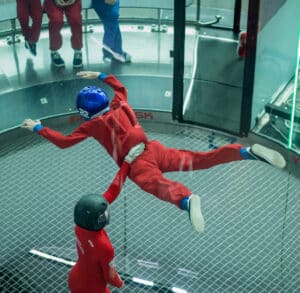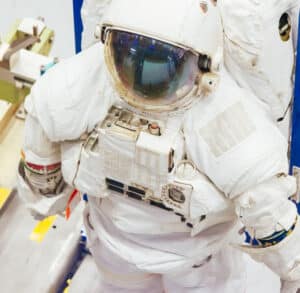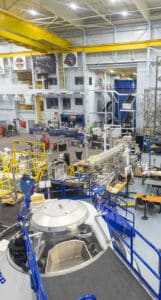Mary Cooper Wants Anyone to Have the Chance to Go to Space
By Mike Crist, For The Amputee Coalition
 Mary Cooper wants to go to space. It has been her dream since she was a little girl. She is taking steps to get there.
Mary Cooper wants to go to space. It has been her dream since she was a little girl. She is taking steps to get there.
But her dream–her mission, if you will–goes beyond that. Mary wants everyone to go to space, or at least everyone who wants to go.
And that includes people with disabilities.
“I really hope to help make space flight safe,” she said. “Whether I get to be the one that flies or not, I want to make sure it’s safe for everybody.” Mary, 24, is an engineer who works for SpaceX in Los Angeles. She began working there last year.
She is a graduate of Stanford University, with a bachelor’s degree in aerospace and computer science and a master’s in aeronautical and astronautical engineering.
 At Stanford, she was a member of the rowing team, even though she had never rowed before she got there. That is not an easy sport for anyone, let alone someone who was born with a condition that required the amputation of her left leg below the knee.
At Stanford, she was a member of the rowing team, even though she had never rowed before she got there. That is not an easy sport for anyone, let alone someone who was born with a condition that required the amputation of her left leg below the knee.
Mary is not one who looks for the easy road, though.
“I think I just always have enjoyed a challenge and looked for an adventure,” she said. “I always was drawn to aerospace, and I think that is part of the reason. I also like it because it gives you the opportunity to define your own success.”
As an engineer, Mary has found living with limb loss to be an advantage. Figuring out ways to do things other people take for granted, and working on her prostheses when something goes wrong, has honed her problemsolving skills.
Those skills have taken the selfdescribed military brat a long way.
 Her first experience with SpaceX, the private space flight company founded more than 20 years ago by billionaire Elon Musk, was an internship in college. She also spent a summer abroad at Oxford University in England.
Her first experience with SpaceX, the private space flight company founded more than 20 years ago by billionaire Elon Musk, was an internship in college. She also spent a summer abroad at Oxford University in England.
She has been an ambassador for Mission: AstroAccess, a project whose website says it is “dedicated to promoting disability inclusion in space exploration by paving the way for disabled astronauts in STEM by launching disabled scientists, veterans, students, athletes, and artists on parabolic flights with the Zero Gravity Corporation (ZERO-G), as the first step in a progression toward flying a diverse range of people to space.”
Mary has completed two zero-gravity flights, along with pilot training.
Last year, she went to Poland for analog astronaut training. The training simulates conditions of long-duration space flights and expeditions in places on Earth with geographic conditions similar to other planets or the moon. Mary’s training simulated a mission to the moon.
The inspiration from this scientific and psychological research was twofold. One was “learning and getting to do cool stuff.” Two was seeing others with a range of disabilities–people with blindness, people who use wheelchairs–experience the same things she did.
“Life inside the habitat is really similar to a real space station,” said Mary, who was named executive officer for her crew, a role she found fulfilling. “It’s awesome.”
Mary’s father recently retired from the Coast Guard, where he served as a helicopter pilot. Perhaps that fostered her love of flight, and she said she has always been interested in aerospace.
She has faced her share of obstacles. Her goal in high school was to gain admission to one of the U.S. military academies, but she did not meet the physical requirements.
Likewise, physical requirements would keep her out of NASA’s astronaut training.
She has come along at a good time. Private companies have joined the aerospace industry and helped to ignite renewed interest among the public.
“NASA isn’t the only player in the game now,” Mary said, “and NASA is also looking at changing its requirements.”
It’s a far cry from when she first discovered her love of space.
“I didn’t see a lot of astronauts who looked like me,” Mary said. “But, at the same time, my parents never looked at me differently. They always encouraged me to believe in myself and supported in me in whatever I tried.”
That included soccer, swimming, surfing, and track and field. She has also been a para-athlete.
The constant in her life remains her dreams of space and her work in the field.
“I really enjoy my job,” she said. “I am glad I studied engineering in college, because you need a lot of that technical background. But I also like working on the operational side of it. I think this job allows me to combine my natural strengths.”

